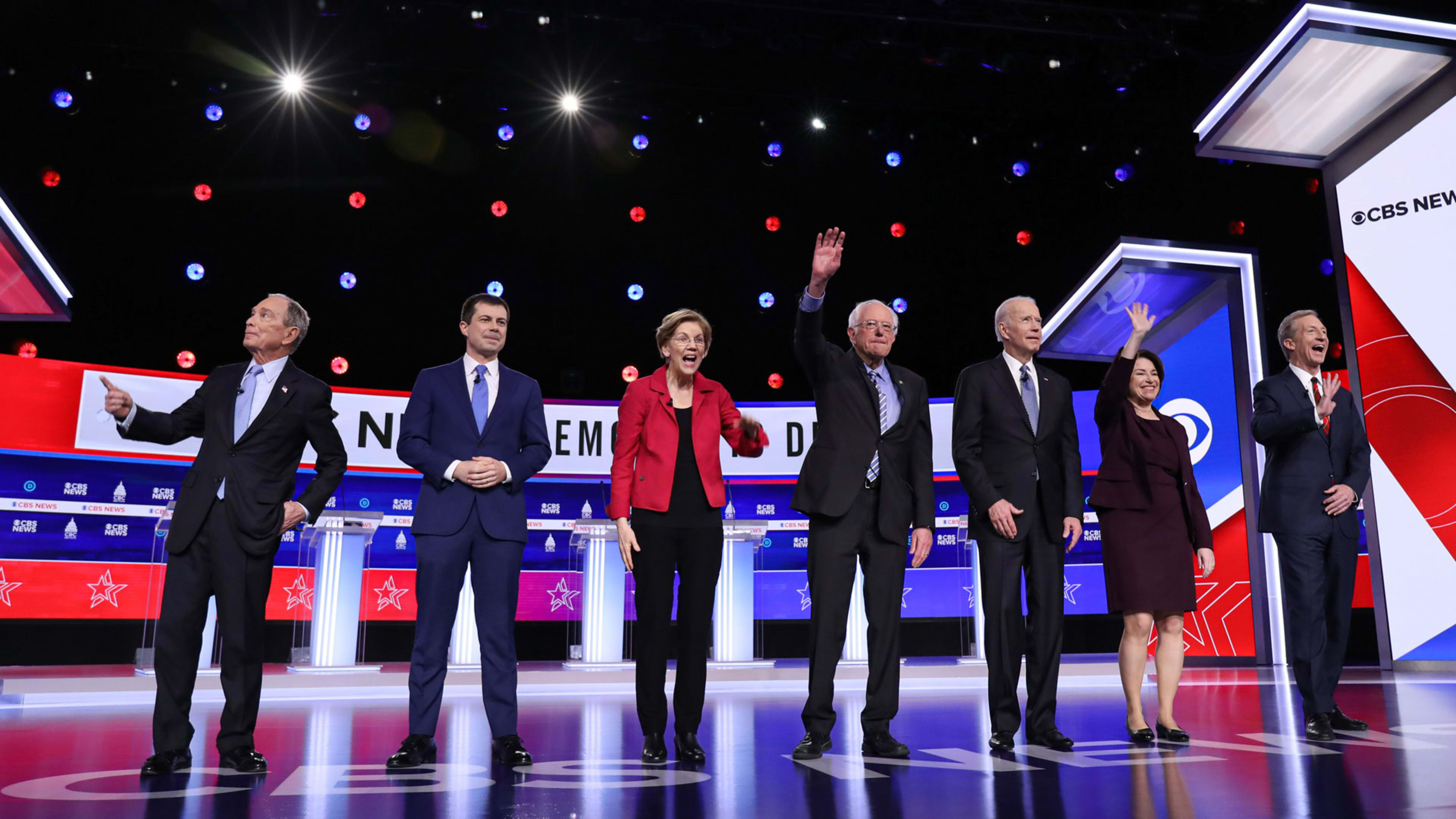Last week, more than two years after sexual misconduct allegations against Harvey Weinstein catalyzed a movement of accountability, the disgraced producer was convicted of rape.
And yet, even now—in the first presidential race of the #MeToo era—we have two candidates facing credible sexual harassment claims. Since Donald Trump’s 2016 campaign, there has been a steady stream of allegations against him. And Michael Bloomberg, whose company has faced a litany of harassment allegations, has come under fire both on and off the debate stage for refusing to let former employees out of their nondisclosure agreements. Days later, Bloomberg decided to release three former employees—women who had brought complaints against him—from their NDAs.
With the primary election well underway, we’re digging into the presidential candidates’ positions on key issues that affect working Americans. Today, we’re taking a look at how all the candidates in the race plan to address sexual misconduct and gender discrimination in the workplace.
Elizabeth Warren
Nearly all of the candidates—Warren included—have come out in support of the Be Heard Act, which was introduced in Congress last year. The wide-ranging legislation would nix the tipped minimum wage, ban forced arbitration clauses, extend federal protections against discrimination to contract workers and small businesses, provide legal aid to low-income workers, and conduct a national survey of workplace harassment. Warren also coauthored the Sunlight in Workplace Harassment Act, which would require public companies to come forward with harassment and discrimination settlements. In her own campaign, Warren has reportedly introduced trainings and policies to “create a safe and inclusive organization that lives the values we fight for every day.”
Warren plans to strengthen the Equal Employment Opportunity Commission (EEOC) as well, by increasing funding. “It will also issue first-of-its-kind guidance on enforcing claims involving the intersectional discrimination that women of color face from the interlocking biases of racism and sexism,” she says in a plan to help women of color in the workplace.
Warren, who has openly shared her own experience with pregnancy discrimination, also supports the Pregnant Workers Fairness Act (along with many of her fellow candidates). The proposal would force employers to provide reasonable accommodations to pregnant workers.
Joe Biden
Biden has been vocal on issues of domestic violence and sexual violence on college campuses for decades. In the early nineties, he was a key sponsor of the Violence Against Women Act, which he calls his “proudest legislative achievement.”
When it comes to sexual misconduct in the workplace, Biden—who has himself faced multiple allegations of inappropriate behavior—is in favor of the Be Heard Act, National Domestic Workers Bill of Rights, and Pregnant Workers Fairness Act. He also plans to introduce legislation that will put an end to forced arbitration clauses. “By getting rid of mandatory individual arbitration, he will also support employees’ ability to band together in the courts to address their collective issues through class action lawsuits and to bring class claims through arbitration,” reads his plan to address violence against women.
Amy Klobuchar
In 2018, Amy Klobuchar spearheaded legislation that makes it easier to bring harassment claims in Congress and ensure that the accused are held financially liable for harassment and retaliation settlements. Klobuchar, too, hopes to pass the Be Heard Act and Pregnant Workers Fairness Act. She has also backed legislation like the Combating Sexual Harassment in Science Act, which would invest in studying and preventing sexual harassment in the STEM field. In her own campaign, Klobuchar reportedly has “strong guidelines and policies in place” to protect staffers against harassment.
Bernie Sanders
Last year, Bernie Sanders had to contend with numerous reports of sexual harassment and sexism from his 2016 campaign. His campaign has since introduced a lengthy set of guidelines to right the ship.
Beyond the confines of his campaign, Sanders has cosponsored the Be Heard Act and endorsed the Equality Act, which would secure protections against harassment and discrimination in the workplace for the LGBTQ community. Sanders also sees unions as a key part of addressing sexual misconduct and discrimination. “One of the most important things we can do to stop workplace harassment and discrimination is to make it easier for workers to join unions to protect workers from exploitation and violations of labor laws,” reads his Workplace Democracy plan.
Tulsi Gabbard
As a veteran, Tulsi Gabbard has focused her advocacy more on sexual misconduct in the military. Gabbard has backed the Military Justice Improvement Act, which would change how the military prosecutes sexual assault and provide a pathway for reporting allegations outside the chain of command. “The Military Justice Improvement Act really seeks to bring about this culture shift in our military to make sure that there is transparency, that those who are survivors of sexual assault have someone to speak to, that they have an advocate who will work on their behalf,” she told Fortune and Time’s Up. Gabbard is also in favor of the Pregnant Workers Fairness Act.
Michael Bloomberg
Bloomberg, whose company has been the target of discrimination and harassment lawsuits from 64 employees, has expressed he has “zero tolerance for sexual harassment,” but has been relatively quiet on the matter until recently. After releasing three former employees from their NDAs, Bloomberg pledged support for the Be Heard Act and committed to review his company’s policies around harassment and discrimination. “I want my company to be a model for women seeking opportunity and support in their careers,” he said in a statement.
Donald Trump
Despite facing more than 20 sexual misconduct allegations, President Trump has offered little more than a blanket denial. His reelection campaign, however, does reportedly have a hotline for staffers to disclose allegations of inappropriate behavior and “best-in-class” sexual harassment policies. For a recent series with Fortune and Time’s Up, a White House spokesperson declined to comment on questions about sexual harassment and pregnancy discrimination.
Recognize your brand’s excellence by applying to this year’s Brands That Matter Awards before the early-rate deadline, May 3.
